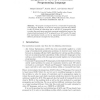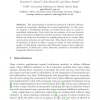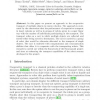121
click to vote
ANTSW
2008
Springer
15 years 3 months ago
2008
Springer
Abstract. This paper analyzes the popular ant-based clustering approach of Lumer/Faieta. Analysis of formulae unveils that ant-based clustering is strongly related to Kohonen’s S...
107
click to vote
ANTSW
2008
Springer
15 years 3 months ago
2008
Springer
Abstract. Ant colony optimization (ACO) is a metaheuristic that produces good results for a wide range of combinatorial optimization problems. Often such successful applications us...
104
click to vote
ANTSW
2008
Springer
15 years 4 months ago
2008
Springer
We implement a self-organized flocking behavior in a group of mobile robots and analyze its transition from an aligned state to an unaligned state. We briefly describe the robot an...
ANTSW
2008
Springer
15 years 4 months ago
2008
Springer
Self-assembling multi-robot systems can, in theory, overcome the physical limitations of individual robots by connecting to each other to form particular physical structures (morph...
107
click to vote
ANTSW
2008
Springer
15 years 4 months ago
2008
Springer
We propose to integrate ACO in a Constraint Programming (CP) language. Basically, we use the CP language to describe the problem to solve by means of constraints and we use the CP ...
127
click to vote
ANTSW
2008
Springer
15 years 4 months ago
2008
Springer
We present a distributed control strategy that lets a swarm of satellites autonomously form a lattice in orbit around a planet. The system, based on the artificial potential field ...
ANTSW
2008
Springer
15 years 4 months ago
2008
Springer
The improvement of odometry systems in collective robotics remains an important challenge for several applications. In this work, we propose a localisation strategy in which robots...
118
click to vote
ANTSW
2008
Springer
15 years 4 months ago
2008
Springer
In this paper we present an approach to the cooperative transport of multiple objects in swarm robotics. The approach is motivated by the observation that the performance of cooper...
121
click to vote
ANTSW
2008
Springer
15 years 4 months ago
2008
Springer
This paper presents an ant-inspired algorithm for building a self-organizing information system of a Grid. Ant-inspired mobile agents travel the Grid through P2P (peer-to-peer) int...
116
click to vote
ANTSW
2008
Springer
15 years 4 months ago
2008
Springer
Abstract. Haplotype Inference is a challenging problem in bioinformatics that consists in inferring the basic genetic constitution of diploid organisms on the basis of their genoty...



